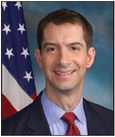A warning on opioid overdoses from unwashed poppy seeds

A warning on opioid overdoses from unwashed poppy seeds
An opioid epidemic is sweeping the country. More than sixty thousand Americans are dying from opioid overdoses each year-more than the number of Americans who died in all twenty years of the Vietnam War. What a staggering fact that is. But behind each number is a tragedy for a family who loses its loved one. Today, I want to tell the story of the Hacala family from Rogers, Arkansas.
It’s a story of love, persistence, courage. And, I hope, a story that will save other families from the tragedy they felt.
I met Betty and Steve Hacala three weeks ago at a roundtable on the opioid epidemic in Little Rock with Attorney General Leslie Rutledge, state and local law enforcement, and the families of opioid victims. The news is full of tragic deaths from heroin, fentanyl, and prescription drugs. I met families that day whose children died from those well-known drugs. But I learned from the Hacalas about another killer: unwashed poppy seeds.
Their son, Stephen Jr., died in his sleep from an overdose two years ago. Stephen was only 24 years old, a recent graduate of the University of Arkansas. He loved to play guitar, and he was very accomplished at it. He was the joy of his parents’ life; he was the joy of his sisters Christina and Lauren’s lives. His sudden death came as a shock to them. But they got another shock when an autopsy determined that Stephen died of morphine intoxication. There were no drugs in his apartment-no pill bottles, no needles, nothing. What had been found was a five-pound bag of unwashed poppy seeds; Stephen had ordered the seeds on Amazon. The Arkansas Crime Lab soon determined that the poppy seeds were the source of the morphine that killed Stephen.
Stephen’s death resulted in part because of a dangerous gap in our nation’s drug laws. It’s been well known for ages that poppies are dangerous, both addictive and toxic. That’s why it’s illegal to grow or own almost any part of the poppy-the straw, the pod, the latex. But there’s an exception, of course, for poppy seeds, which many people enjoy on bagels, muffins, cakes, and other pastries. The seed itself isn’t addictive, but unwashed seeds tend to still have bits of the plant on them, which can be washed off and used to create a powerful narcotic. To give you a sense of just how deadly poppy-seed tea can be, a lethal dose of morphine is about 200 milligrams, but researchers at Sam Houston State University, commissioned by the Hacalas, concluded that there were about 6,000 milligrams of morphine in that five-pound bag of seeds that Stephen bought. That’s over 30 times the lethal dose. Stephen had no way of knowing just how toxic these seeds were.
While there are plenty of legitimate uses for washed poppy seeds, there are no legitimate uses for unwashed seeds. Yet drug dealers and unscrupulous merchants are abusing the legal status of washed seeds to profit and to push unwashed seeds, which are widely available through online retailers. And when you read the user comments, you can easily find instructions for how to brew poppy-seed tea and a description of its narcotic effects. So there’s no question of these unwashed seeds being used for grandma’s poppy-seed cake-it’s plain they’re being used to smuggle the banned drug into our homes, and the manufacturers and distributors should know that.
And Betty and Steve made sure they did. It’s hard to imagine the grief they feel. It would’ve been easy to despair. But they did not. They wanted to save other families from their fate, to be sure Stephen’s death would have meaning. They researched the issue, commissioning that report at Sam Houston State and studying the market for unwashed poppy seeds. And they became advocates, meeting with community leaders and elected officials. As I said, I only learned about the danger of unwashed poppy seeds by meeting the Hacalas.
After that meeting, I put in a call to the leadership of Walmart and Amazon, which at the time both allowed unwashed poppy seeds to be sold on their websites. They listened to our case and quickly agreed to stop selling poppy seeds that are labeled as unwashed. This is important. The two behemoths of online commerce agreeing to take down those seeds was a victory and a testament to what normal citizens like Steve and Betty can accomplish.
But this is more than a labeling problem. In fact, some of the most potent and deadly seeds, which we know about thanks to the work of Steve and Betty, are not labeled as unwashed and are still available for purchase.
Therefore, I will work in the Senate and with the Drug Enforcement Agency to ban unwashed seeds entirely, but today I do want to take a moment to thank Amazon and Walmart for taking an important first step-for our country, for our state, and for the Hacalas and families like theirs.
It’s always hard to lose a loved one, and a child is the hardest loss of all. I suspect that nothing can assuage that kind of grief. But because of the Hacalas’ courage and determination, we can hope that a few more families will be spared it. That’s an act of true love, for Stephen and for their fellow Americans.

From U.S. Senator Tom Cotton

